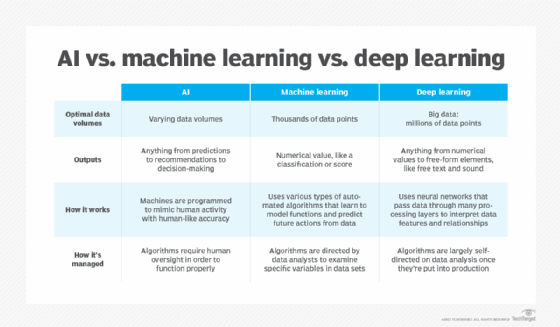AI engineers: What they do and how to become one
Learn what it takes to launch a rewarding career as an AI engineer, including required skills, responsibilities, qualifications, educational opportunities and top salaries.
Artificial intelligence, or AI, is one of the hottest sectors in IT as interest and demand for the emerging technology continues to grow.
The debut of ChatGPT in 2023 accelerated interest in AI and specifically in generative AI. That interest has led to a wave of adoption and technology development as organizations of all sizes attempt to capitalize on its potential benefits.
Enterprise demand and interest in AI has led to a corresponding need for AI engineers to help develop, deploy, maintain and operate AI systems. An individual who is technically inclined and has a background in software programming might want to learn how to become an artificial intelligence engineer and launch a lucrative career in AI engineering.
This article details what a career as an AI engineer is all about, providing insights into the skills, responsibilities, compensation and the future outlook for this profession.
What is artificial intelligence?
AI is a form of mathematical computation that can appear in limited respects to simulate human intelligence. The technology is used across all manner of IT systems to improve operations by providing automation and intelligence.
This article is part of
What is enterprise AI? A complete guide for businesses
AI has the potential to simplify and enhance business tasks commonly done by humans, including business process management, speech recognition and image processing.
Many AI applications depend heavily on natural language processing (NLP) and deep learning. These technologies can train computers to do certain tasks by processing massive amounts of data and identifying patterns in the data.
In addition to analyzing information faster, AI can spur more creative thinking about how to use data by providing answers that humans might not have considered.
With the emergence of generative AI, the possibilities and applicability of AI have expanded. Generative AI is used to summarize content and enable conversational chatbots as well as generate new content. Modern generative AI can create text, audio and video, often with nothing more than simple text prompts.

What are AI engineers and what do they do?
AI engineers develop, program and train the complex networks of algorithms that encompass AI so those algorithms can work like a human brain. AI engineers must be experts in software development, data science, data engineering and programming. They uncover and pull data from a variety of sources; create, develop and test machine learning models; and build and implement AI applications using embedded code or application program interface (API) calls.
Key responsibilities of AI engineers
AI engineers play a crucial role in developing and implementing AI. The responsibilities of this role have evolved to meet the demands of modern generative AI applications and fall under multiple categories. Here are the key facets of the job of AI engineer, followed by responsibilities.
1. AI model development and management
- Building AI models using machine learning algorithms, deep learning neural networks and large language models (LLMs).
- Developing and fine-tune generative AI models for various applications.
- Optimizing AI models for performance, efficiency and scalability.
2. MLOps and AI lifecycle management
- Managing the AI lifecycle, from development to deployment and monitoring.
- Implementing continuous integration/continuous delivery pipelines for AI models.
- Automating model retraining and versioning processes.
3. Ethical AI and responsible development
- Ensuring AI systems are developed ethically and with consideration for potential biases.
- Implementing fairness, accountability and transparency in AI models.
- Conducting regular audits to identify and mitigate biases in AI systems.
4. Infrastructure and data management
- Creating and managing AI product development and infrastructure.
- Creating data transformation and data ingestion infrastructures.
- Automating the infrastructure used by the data science team.
5. Analysis and experimentation
- Performing statistical analysis and interpreting the results to help the company make better business decisions.
- Running AI and machine learning experiments and tests.
What are the required skills and education for AI engineers?
AI engineers need to have a combination of technical and nontechnical business skills.
Technical skills
- Extensive knowledge of statistics, calculus or algebra to work with algorithms and an understanding of probability to interact with some of AI's most common machine learning models, including naive Bayes, hidden Markov and Gaussian mixture models.
- Proficiency with popular programming languages, such as Python, C++, Java and R to develop and deploy AI models.
- Solid understanding of algorithms and applied mathematics to build, modify and use AI models.
- Good knowledge of NLP, which combines computer science, information engineering, linguistics and AI in one system, plus the ability to program the system to process and analyze large data sets.
- Familiarity with generative AI frameworks and architectures, such as transformers and generative adversarial networks (GANs).
- Experience with LLMs and their applications.
- Knowledge of prompt engineering and fine-tuning techniques for generative AI models.
- Understanding of potential biases and ethical considerations in AI systems.
- Proficiency in working with cloud-based AI platforms and services.
Nontechnical business skills
- Ability to clearly communicate project goals, timelines and expectations with stakeholders, including data scientists, data analysts, research analysts, software engineers, marketing managers and product teams.
- Ability to think critically, creatively and analytically to solve problems in real time; evaluate numbers, trends and data and develop conclusions based on findings; question established business practices; and suggest new approaches to the AI process.
- Ability to work in a collaborative and supportive work environment.
- Possession of business acumen and industry knowledge.
Education
- Bachelor's degree in a field related to AI, such as data science, computer science, IT or statistics.
- Master's degree -- though not always required -- in such disciplines as data science, mathematics, cognitive science or computer science.
- Enrollment in additional AI-related courses and certification programs (see section "What courses and certifications are available to AI engineers?").
Continuing education
- Enrollment in AI-related courses and certification programs.
- Participation in workshops and bootcamps focused on generative AI and emerging technologies.
- Pursuit of specialized certifications in areas such as machine learning, deep learning and AI ethics.
- Attendance at AI conferences and seminars to stay current on the latest advancements in the field.
Tools and software used by AI engineers
AI engineers rely on a diverse set of tools to design, develop and deploy AI systems. These tools span various categories, from programming languages to specialized frameworks and cloud platforms.
Programming languages and core libraries
- Python. The de facto standard language of AI development, Python offers simplicity and a vast ecosystem of libraries.
- NumPy and Pandas. Essential for numerical computing and data manipulation in Python.
Deep Learning Frameworks
- TensorFlow. This is an open source framework for building and training neural networks, backed by Google.
- PyTorch. Known for its flexibility and dynamic computation graphs, PyTorch is popular in research settings.
- Keras. A high-level API that simplifies neural network development, Keras is often used with TensorFlow.
Cloud platforms and AI services
- Amazon Web Services. AWS has multiple services, including Amazon SageMaker and Bedrock.
- Google Cloud Platform. GCP offers a variety of AI services, including Vertex AI and TensorFlow Enterprise.
- Microsoft Azure AI. Microsoft's platform includes a comprehensive suite of AI and machine learning services.
Specialized AI services
- OpenAI API. Provides access to powerful language models like GPT-3.5 and GPT-4.
- Hugging Face. A platform for sharing and collaborating on NLP models.
- IBM Watson. A suite of enterprise-ready AI services and applications.
- Anthropic Claude. An LLM API for various AI applications.
- Replicate. A platform for running and sharing machine learning models in the cloud.
What is the salary of an AI engineer?
The salary of an AI engineer varies depending on the specific job and location. There is also significant variation in reported salary ranges based on the reporting source.
The average annual salary for an AI engineer in the U.S. was $106,386 as of September2024, according to ZipRecruiter. The site found that AI engineer salaries in the U.S. can be as low as $44,000 and as high as $173,500, while most AI engineer salaries across the U.S. currently range between $76,000 to $132,500, with top earners making $156,000 annually.
According to technology career platform Built In, the average base salary in the U.S for an AI engineer is $155,918. Built In reports a minimum salary of $80,000 rising to a maximum of $338,000.
What careers are available to AI engineers?
IT professionals who pursue careers as artificial intelligence engineers can provide organizations with valuable insights into future issues and critical business decisions. Many industries use AI technology in a variety of applications, such as the following:
- Financial services companies determine the habits of users to better identify fraudulent and suspicious activity.
- Manufacturers reevaluate supply chains and schedule predictive maintenance to ensure that products are made safely, efficiently and less expensively.
- Healthcare organizations automate processes to improve patient engagements and reduce the time and costs associated with pharmaceutical development.
- Businesses uncover key insights about customer behavior, sentiment and buying patterns to improve customer engagements.
What courses and certifications are available to AI engineers?
The following are some of the courses and certifications AI engineers can take to keep on top of the technology. More details on AI certifications can be found here. The following is a roundup of top undergraduate and graduate degree programs in AI:
- Artificial Intelligence Graduate Program by Stanford University School of Engineering.
- AI for Everyone by Andrew Ng (Coursera).
- IBM Applied AI Professional Certificate (Coursera).
- Introduction to TensorFlow for Artificial Intelligence, Machine Learning and Deep Learning (Coursera).
- Artificial Intelligence A-Z (Udemy).
- Artificial Intelligence: Reinforcement Learning in Python (Udemy).
- Getting Started with AI and Machine Learning (LinkedIn Learning).
What is the future of AI engineering?
The future of AI engineering is likely one that includes no shortage of growth and innovation. The following are among the forward-looking trends in AI engineering:
- Autonomous systems. There is likely to be more usage and deployment of autonomous systems, including self-driving cars and robots that will need even more sophisticated levels of AI technology.
- Quantum computing. The practical utility of quantum computers is getting closer to reality, which could have a significant impact on AI engineering. Quantum computers can potentially speed up certain types of algorithms and solve complex problems faster than classical computing systems.
As AI technology becomes more complex, new specialized roles could also emerge, including the following:
- AI ethics officer. A new role that is responsible for ensuring AI systems are developed and deployed ethically.
- Quantum AI specialist. This role will have a focus on the integration of AI and quantum computing technologies.
- AI infrastructure engineer. This job category will specialize in creating and managing AI development as well as production infrastructure.
Sean Michael Kerner is an IT consultant, technology enthusiast and tinkerer. He has pulled Token Ring, configured NetWare and been known to compile his own Linux kernel. He consults with industry and media organizations on technology issues.








